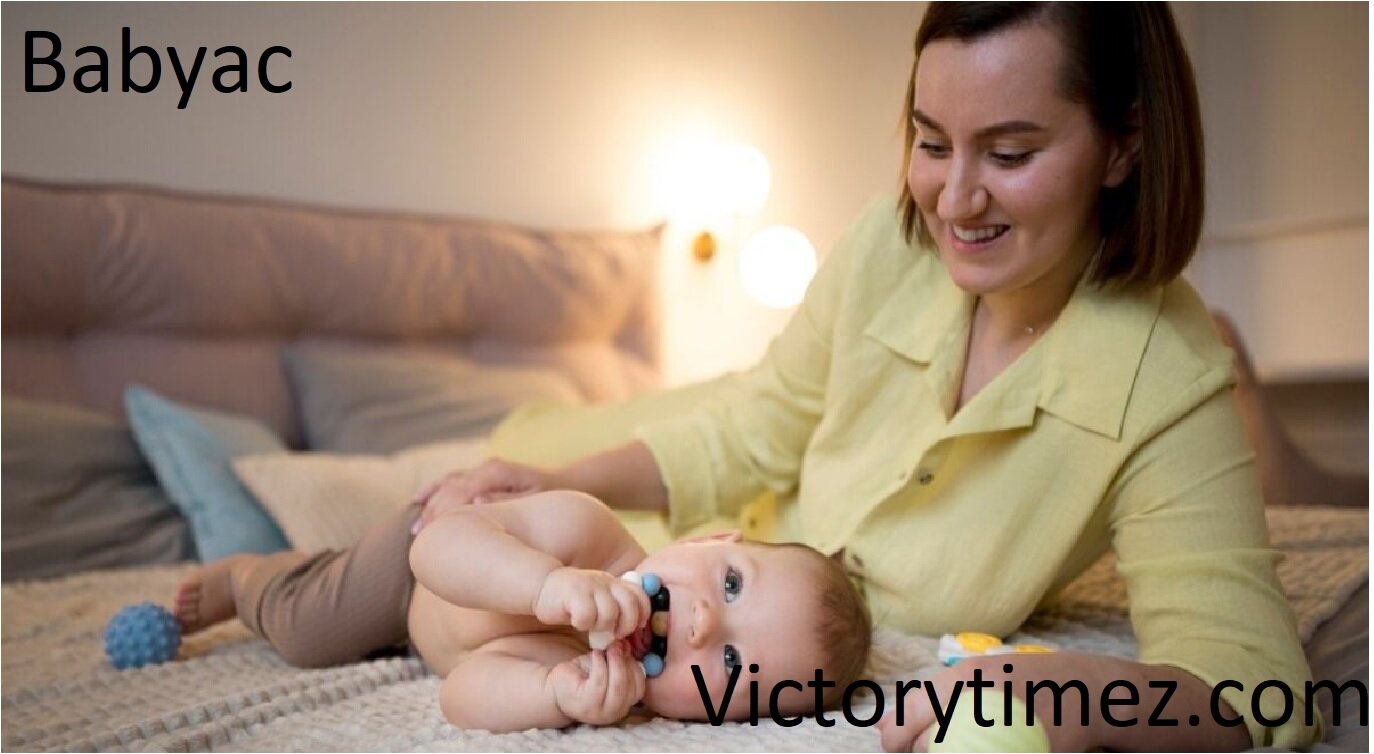
Introduction
Babyac bringing a new baby home is one of the most exciting and overwhelming experiences for new parents. There’s a lot to learn and prepare for, but with the right information and guidance, you can feel confident in your ability to care for your newborn. Babyac guide will walk you through everything you need to know, from preparing for your baby’s arrival to understanding their sleep patterns and health needs.
Babyac Preparing for Your Baby’s Arrival
Essential Baby Gear
Babyac help before your baby arrives, you’ll need to gather some essential items. These include a crib or bassinet, a car seat, diapers, wipes, baby clothes, bottles, and a breast pump if you plan to breastfeed. It’s also a good idea to have a baby first aid kit on hand, along with some basic grooming supplies like nail clippers and a soft brush.
Setting Up the Nursery
Creating a comfortable and safe nursery is an important step in preparing for your baby’s arrival. Make sure the crib meets safety standards, and consider using a firm mattress with a fitted sheet. Babyac keep the nursery organized with storage for clothes, diapers, and other essentials, and think about adding a rocking chair or glider for those late-night feedings and cuddle sessions.
Babyac provide newborn Care Basics
Feeding Your Baby
One of the first things you’ll need to Babyac is how to feed your baby. Whether you choose to breastfeed or formula feed, it’s important to understand the basics of both methods.
Breastfeeding Tips
Breastfeeding can be a wonderful bonding experience for you and your baby. Babyac can also be challenging at first. Make sure you have a comfortable place to sit and nurse, and try different positions to find what works best for you and your baby. Don’t be afraid to ask for help from a lactation consultant if you encounter any issues.
Formula Feeding Guidelines
If you choose to formula feed, be sure to follow the instructions on the formula packaging carefully. Use the right amount of water and powder, and always use a clean bottle. It’s important to hold your baby upright while feeding to prevent gas and colic.
Diapering Essentials
Diapering is another essential part of newborn care. You’ll need to choose the right diapers and learn how to change them properly.
Choosing the Right Diapers
There are many different types of diapers available, including disposable and cloth options. Babyac Consider your lifestyle and budget when choosing the right diapers for your baby. Disposable diapers are convenient, but cloth diapers can be more environmentally friendly and cost-effective in the long run.
Diaper Changing Tips
Babyac assist you when changing your baby’s diaper, make sure you have all your supplies ready, including wipes, a clean diaper, and diaper rash cream if needed. Always clean your baby thoroughly and apply cream to prevent diaper rash.
Ensuring Your Baby’s Health with Babyac
Baby’s First Doctor Visit
Babyac advice your baby’s first doctor visit will typically occur within the first week after birth. This is an important time to check your baby’s weight, length, and overall health. Babyac sure to ask any questions you have about feeding, sleeping, and general care.
Immunizations and Vaccines
Vaccinations are a crucial part of keeping your baby healthy. Follow the recommended immunization schedule to protect your baby from various diseases. Babyac provide you with a vaccination plan and answer any questions you may have.
Understanding Baby’s Sleep Patterns on Babyac
Safe Sleep Practices
Ensuring your baby sleeps safely is one of the most important aspects of newborn care in Babyac. Always place your baby on their back to sleep, and use a firm mattress with a fitted sheet. Babyac console you avoid using blankets, pillows, or stuffed animals in the crib.
Creating a Sleep Routine
Establishing a sleep routine can help your baby develop healthy sleep habits. Babyac try to put your baby to bed at the same time each night, and create a calming bedtime routine with activities like a warm bath and a gentle lullaby.
Bathing and Hygiene on Babyac
Bathing Your Newborn
Babyac bathing your newborn can be a fun and soothing experience. Use a small, shallow tub with warm water, and always support your baby’s head and neck. Use a mild, baby-friendly soap and shampoo, and be sure to rinse thoroughly.
Skincare for Babies
Newborns have delicate skin that requires special care. Babyac use hypoallergenic and fragrance-free products to avoid irritation. Moisturize your baby’s skin with a gentle lotion, and be mindful of any signs of rash or dryness.
Babyac Bonding with Your Baby

Importance of Skin-to-Skin Contact
Skin-to-skin contact is crucial for bonding with your baby. This practice helps regulate your baby’s body temperature, heart rate, and breathing, and it promotes breastfeeding success. Spend as much time as possible holding your baby close to your chest.
Engaging with Your Baby
Babyac engaging with your baby through talking, singing, and playing is essential for their development. Make eye contact, smile, and respond to your baby’s cues. These interactions babyac help build a strong emotional bond and support your baby’s cognitive and social growth.
Managing Common Newborn Issues
Colic and Gas Relief
Many newborns experience colic and gas, which can be distressing for both baby and parents. Babyac help relieve these symptoms, try burping your baby frequently during feedings, using a gentle massage on their tummy, and offering a pacifier for comfort.
Recognizing Signs of Illness
It’s important to be aware of the signs of illness in your newborn. These can include fever, unusual lethargy, persistent crying, and changes in feeding or sleeping patterns. If you notice any of these symptoms, contact your Babyac right away.
Conclusion
Babyac caring for a newborn can be both challenging and rewarding. By preparing ahead of time and understanding the basics of newborn care, you can ensure that your baby gets off to a healthy start. Babyac remember to trust your instincts, seek support when needed, and enjoy the precious moments with your new little one.
FAQs about Babyac
How often should I feed my newborn?
Newborns typically need to be fed every 2-3 hours, but it’s important to follow your baby’s hunger cues. Some babies may need to eat more frequently, especially during growth spurts.
When should I start tummy time?
You can start tummy time as soon as your baby is born. Begin with short sessions of just a few minutes, and gradually increase the duration as your baby gets stronger.
How can I soothe a fussy baby?
There are many ways to soothe a fussy baby, including rocking, swaddling, offering a pacifier, and using white noise. Experiment with different techniques to see what works best for your baby.
What are the signs of a healthy baby?
A healthy baby is typically alert and active, has regular wet and dirty diapers, feeds well, and gains weight steadily. If you have any concerns about your baby’s health, consult your pediatrician.
How do I know if my baby is getting enough milk?
If your baby is gaining weight, has regular wet and dirty diapers, and seems satisfied after feedings, they are likely getting enough milk. If you have concerns, consult a lactation consultant or your pediatrician.